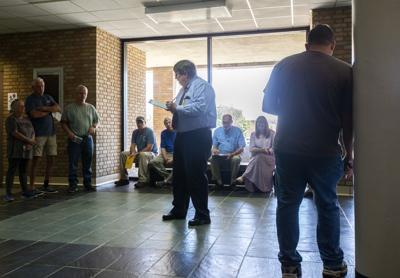South Carolina’s chief justice has stripped former Greenwood judge Curtis Clark of his job presiding over foreclosures, just days after The Post and Courier reported that his family repeatedly won dozens of properties at real estate auctions he ran.
Chief Justice Donald Beatty’s April 11 order instructs court officials not to assign Clark to oversee any new foreclosure cases. It also requires them to identify every case he’s already been tapped to hear so that they can be referred to someone else.
Clark has acted for decades as Greenwood County’s foreclosure judge in everything but title. Because the county doesn’t have a sitting master-in-equity judge, attorneys are appointed to fill that role on a case-by-case basis. Clark is almost always tapped for the job, court records show.
Beatty’s order shuts down the flow of cases indefinitely. It states that Clark cannot be appointed to hear foreclosure cases until further notice.
The decision came just over a week after a Post and Courier Uncovered investigation revealed that Clark’s wife and children had purchased dozens of properties at foreclosure auctions he presided over. Property records also showed that some of the real estate purchased by the family — 33 acres of undeveloped land near his home — was later gifted to him.
What's more, the newspaper found that when state officials asked Clark under oath about his wife’s participation at his foreclosure auctions, he failed to mention that she had won property at them. The state’s judicial screening board, which was then considering him for reelection as master-in-equity judge in neighboring Abbeville County, did not follow up.
Clark told the newspaper that he previously had concerns about having his family bid at auctions but he did not ask the state’s judicial ethics panel for advice. He ultimately decided on his own that they were allowed to participate, just as any other member of the public. His attorney, Desa Ballard of West Columbia, said he still does not plan to request an advisory opinion.
Even so, after the article was published on April 3, Clark opted to have another attorney oversee foreclosure auctions scheduled to take place the next day.
In a written statement April 11, Ballard sought to downplay Beatty’s order, saying the chief justice routinely reassigns judges as he sees fit.
"Mr. Clark is a man of the highest integrity. As such, it was the prudent thing to step aside when Mr. Clark’s conduct was questioned, especially since his family was made the source of inappropriate speculation," Ballard said. "Mr. Clark has not engaged in any misconduct, nor has he communicated with anyone regarding the unwarranted inferences about how he has done his job in the past."
Under South Carolina’s court rules, judges are supposed to avoid even the “appearance of impropriety,” an especially high standard intended to preserve the public’s trust in the courts’ impartiality. Legal ethicists contacted by The Post and Courier said the sales threatened to run afoul of that rule.
The newspaper investigated the Clark family’s participation in foreclosure sales as part of Uncovered, its initiative to shine light on questionable government conduct and voids in oversight. The project is being done in partnership with 18 community newspapers, including The Index-Journal of Greenwood.











